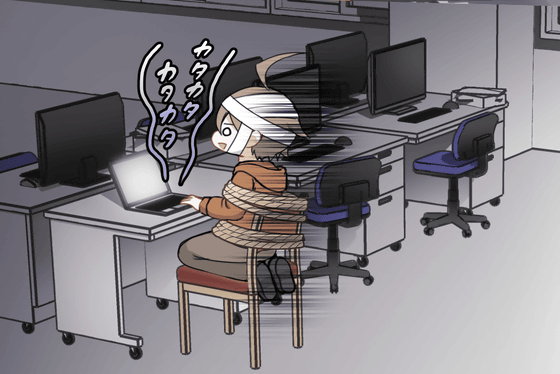'Your favorite game is built on the cries of workers'

by
From the outside, the video game industry may seem like a creative and fun business, but for those who actually work there, it can be mentally and financially tough, say people who have landed jobs at their dream video game companies and industry analysts.
Video Game Creators Are Burned Out and Desperate for Change | TIME
https://time.com/5603329/e3-video-game-creators-union/

Nathan Allen Ortega was offered a managerial position at Telltale Games, a video game development company based in California, in 2015. Telltale Games has released the game version of ' The Walking Dead ' and ' Minecraft: Story Mode ', a story-based game based on Minecraft, and Ortega was a big fan of Telltale, so he was delighted with the offer, saying, 'I've found my dream job.'
However, when he actually started working, Ortega found himself stressed out by the job, developed stomach ulcers, and began vomiting blood. According to Ortega, one of the biggest problems was last-minute changes to the game by company executives. Developers rushed to adjust and change the game, becoming overworked, but last-minute changes do not produce a quality product. 'Every month, I was working on low-quality games full of compromises made by people who were killing themselves to get the game out,' Ortega said.

by
Emily Grace Buck, a former narrative designer at Telltale, said, 'In the game industry, there is a belief that working there is a privilege and that you have to be prepared to do anything to stay there. The most important thing is that not all game studios work this way, but this is the majority and it's normal in this industry.' In fact, the CEO of Rockstar Games, the publisher of ' Red Dead Redemption ,' said in an interview, 'Employees are working 100 hours a week to meet the scheduled release date,' and Activision Blizzard, known for ' Hearthstone ' and ' Overwatch ,' has confirmed various problems, such as a large-scale layoff of nearly 800 people and serious harassment issues .
Activision Blizzard, which owns popular titles such as Call of Duty, carries out large-scale layoffs of over 700 employees - GIGAZINE

The American news magazine TIME interviewed 10 video game industry workers. The results of the interviews revealed that the working hours and job instability that Ortega experienced are not at all uncommon in the game industry. In particular, in the game and software development industry, it is common for people to 'work 100 hours a week without extra pay' in the weeks leading up to the release of a game. Furthermore, in recent years, such a situation has worsened for certain reasons.
Around 2000, if you wanted to play a game, you would go to a toy store or game shop to buy a package released by a game company, and when you finished playing, you would go back to play it from the beginning or buy another game. However, in modern times, 'more than 90% of video game consoles are connected to the Internet,' points out video game industry analyst Matt Piscatella. Game companies often continually update and refresh existing games through 'downloadable content (DLC),' such as new weapons and new stages that players can purchase. Gamers expect DLC to make their favorite games even more enjoyable, and game companies can make additional profits from it, but the existence of DLC keeps employees under pressure even months or even years after the game's release date.
Game studios also often open up their games to the general public for 'beta testing,' which is primarily used for promotion and preview purposes before release, but can also result in last-minute changes being required if bugs or player complaints are discovered.

by The part-time life of a hero and a corporate slave
These changes are painful for game industry workers, but profitable for game companies. According to the NPD Group, a research firm to which Piscatella belongs, digital sales revenues in the US video game market in 2018 are on the rise, at 63%, while total sales are up 38% from two years ago. The reason for this is thought to be the mechanism by which players return to hit titles through DLC and other means.
Michael Camper, a sound designer who has worked in both the video game industry and Hollywood, talks about labor unions from his experience as both a manager and a worker. According to Camper, in Hollywood, there are labor unions for actors, screenwriters, etc., and even if projects are frequently canceled or studios are closed, wages do not immediately become zero and workers can receive health insurance and pensions. On the other hand, Camper has worked at three studios in the game industry, but all of them closed due to poor performance, and at that moment, wages and security disappeared. Camper said, 'Because I have experienced both industries, I want to stay in the game industry and contribute to making this industry better. The current situation is not healthy for either workers or studios.'
Related Posts:
in Game, Posted by log1e_dh






